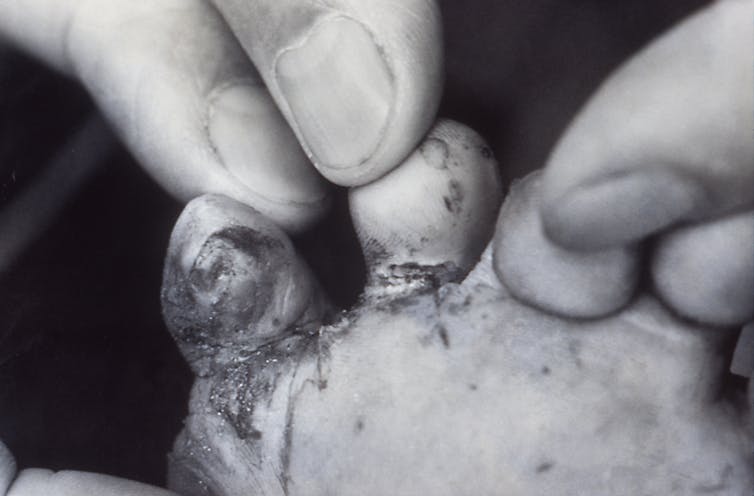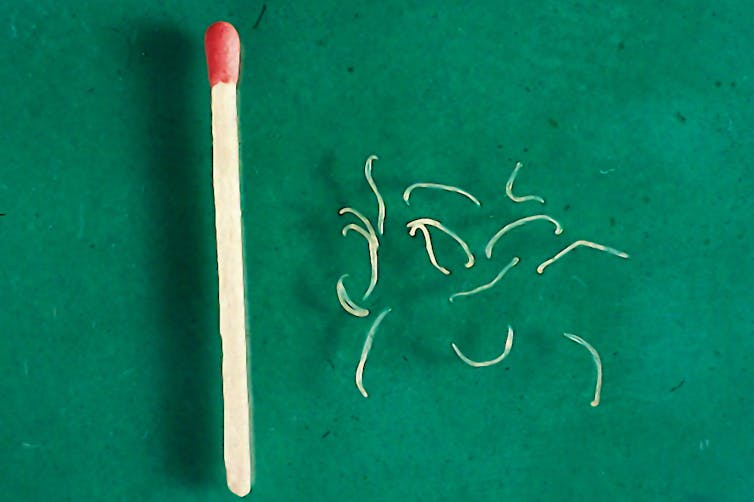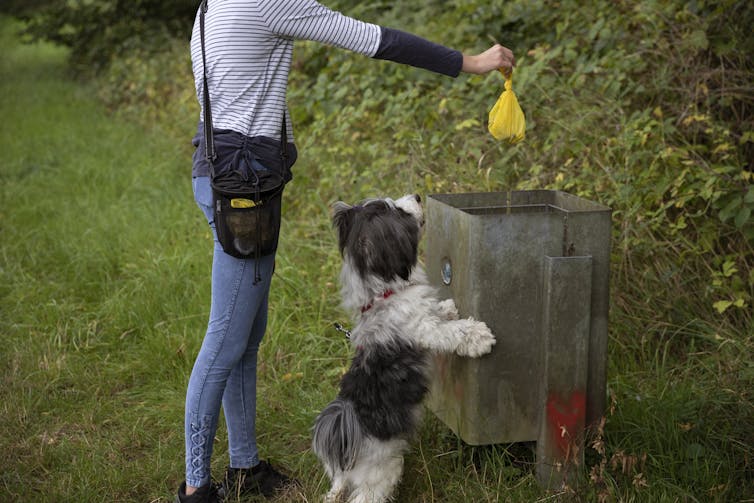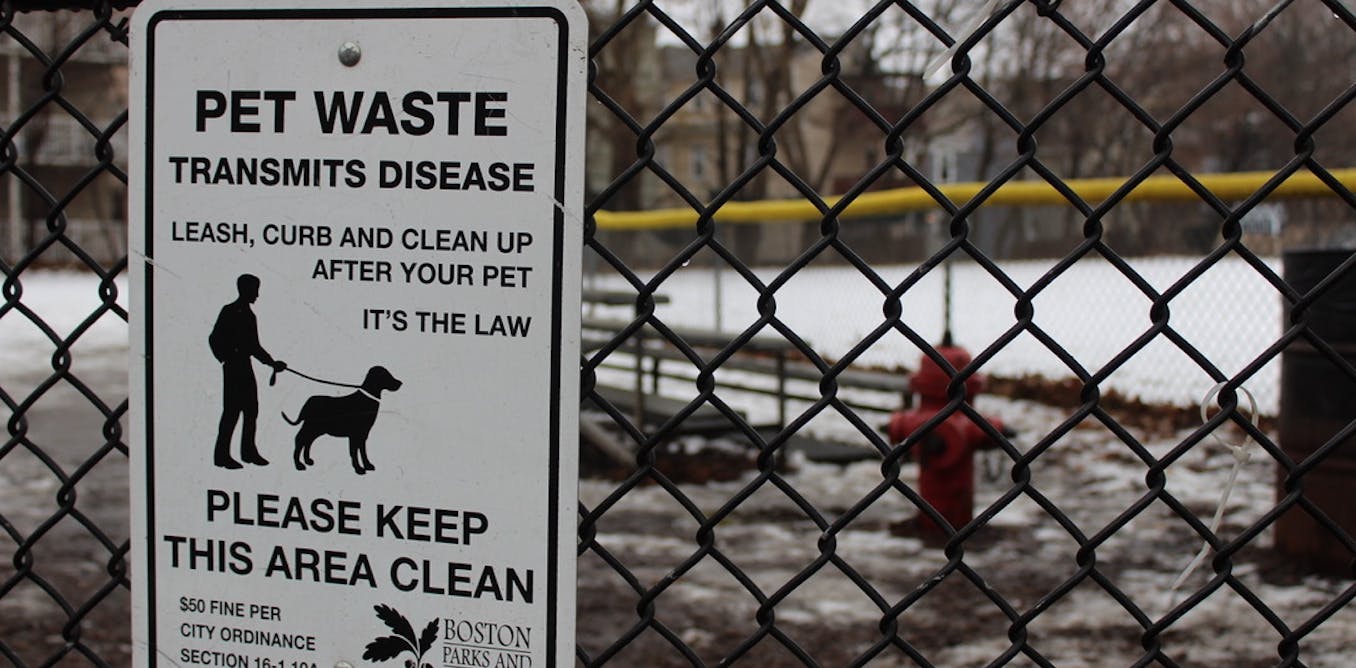[ad_1]
Have you ever ever ever been out on a stroll and as you are taking that subsequent step, you are feeling the slippery squish of poop beneath your foot?
It’s not merely gross. Previous the mess and the scent, it’s doubtlessly infectious. That’s why indicators reminding pet householders to “curb your canine” and scoop their poop have been joined in some areas by posted warnings that pet waste can unfold sickness.
As a small-animal most important care veterinarian, I deal with the diseases of canine and cat poop every day. Feces signify potential zoonotic hazards, meaning they’re going to transmit sickness from the animals to people.
The reality is that waste left to wash into the soil, whether or not or not in a neighborhood, path or canine park, can unfold life-threatening parasites not merely amongst canines and cats, however moreover to wild animals and people of all ages. A 2020 look at found intestinal parasites in 85% of off-leash canine parks all through america.
Whereas human diseases introduced on by soil-transmitted parasites are thought-about uncommon throughout the U.S., they infect as many as an estimated billion people worldwide. Indicators that remind you to pick out up after your pet often aren’t merely attempting to take care of public areas clear; they’re urging you to help safeguard your neighborhood’s nicely being.

Parasites can enter your physique through broken pores and pores and skin and prepare retailer, as on this hookworm an an infection.
Abandoned poop’s impression on people
Widespread canine poop parasites embody hookworms, roundworms, coccidia and whipworms. Hookworms and roundworms can thrive in various species, along with folks.
Their microscopic larvae can get into your physique through small scratches in your pores and pores and skin after contact with contaminated soil or by way of unintended oral ingestion. Understand that subsequent time you’re open air and wipe sweat out of your face with a dirty hand after which lick your lips or take a drink – it’s that easy. After hose or rain water has rinsed contaminated poop into the soil, these parasite eggs can survive and infect for months or years to return.
As quickly as throughout the human physique, every hookworm and roundworm larvae can mature and migrate through the bloodstream into the lungs. From there, coughs help them obtain entry to the digestive tract of their host, the place they leach nutritional vitamins by attaching to the intestinal wall. People with healthful immune applications may current no scientific indicators of an an infection, nonetheless in ample parts these parasites may end up in anemia and malnourishment. They’ll even set off an intestinal obstruction which may require surgical intervention, notably in youthful children.
Furthermore, larval ranges of roundworms can switch into the human eye and, in unusual situations, end in eternal blindness. Hookworms can create a severely itchy scenario known as cutaneous larva migrans as a result of the larval worm strikes barely under the pores and pores and skin of its host.

Grownup hookworms.
As quickly because the parasite’s life cycle is full, it’d exit the host’s physique as an intact grownup worm, which looks as if a small piece of cooked spaghetti.
The impression on totally different animals
Canines and cats can also develop the similar indicators people do attributable to parasitic infections. Together with risks of hookworms and roundworms, pets are moreover inclined to whipworm, giardia and coccidia.
Previous parasites, unattended poop might also be contaminated with canine or feline viruses, equal to parvovirus, distemper virus and canine coronavirus, which will create life-threatening sickness in several canines and cats, notably in grownup animals which may be unvaccinated and puppies and kittens.
These viruses assault rapidly dividing cells, notably the intestinal lining and bone marrow, leaving them unable to take in nutritional vitamins appropriately and unable to produce substitute purple and white blood cells that help defend in the direction of these and totally different viruses. Vaccination can defend pets.
Many species of native wildlife are all through the canid and felid family groups. They, too, are vulnerable to numerous the similar parasites and viruses as pet canines and cats – whereas being rather a lot a lot much less extra prone to have obtained the advantage of vaccinations. Coyotes, wolves, foxes, raccoons, minks and bobcats are vulnerable to contracting parvovirus, coronavirus and distemper.

Be prepared to deal with poop on every stroll.
Accountable pet poop administration
So, wherever your canine or cat relieves himself – on the park, throughout the woods, on the sidewalk, and even in your yard – select up that poop nonetheless on a regular basis avoid contact collectively together with your pores and pores and skin. It’s most safe to utilize a shovel to place the poop immediately proper right into a plastic bag, or put a baggie over your hand to grab the poop after which pull the plastic bag over it. Whereas it’s tempting to go away the “soft-serve” or watery poops behind, these are generally the additional likely culprits for spreading diseases.
Tie up the bag and guarantee to place it in a trash can – not on prime – to avoid inadvertent contamination of a neighbor or sanitation worker. Promptly wash your palms, notably sooner than touching your face or consuming or ingesting. Hand sanitizers can deal with many viruses in your pores and pores and skin, nonetheless they acquired’t kill parasite eggs.
Completely different potential sources of poop – and parasite – publicity are the sandbox, seashores and park sand found beneath and spherical playgrounds. Sand is cozy to lounge on, pleasurable to assemble into castles, and softens the impression should you occur to fall off a play building. Nonetheless cats and totally different small mammals like to make use of it as a litter subject as a result of it’s easy to dig and absorbs moisture. Defending sandboxes when not in use and intently monitoring your environment on the seashore and playground are key steps in the direction of minimizing the risks of publicity for everyone.
By defending your pets on frequent parasite prevention protocols, with annual testing for intestinal parasites and routine elimination of fecal supplies from the environment, chances are you’ll help to attenuate the potential for these diseases amongst the entire mammals in your environment – human, pet and wild.
Key elements to remember to avoid parasites and scale back the impression in your ecosystem:
- Determine waste up and safely throw it out irrespective of the place your pet poops. Sanitize your palms afterward.
- Wash your palms sooner than consuming or touching your face whereas gardening or working throughout the yard.
- Avoid rinsing poop into the soil. Using rain or a yard hose solely removes the seen mess, not the microscopic factors.
- Make sure that sandboxes are coated when not in use.
- Protect your pets on month-to-month intestinal parasite deworming schedules.
- Have your vet examine your pet’s poop yearly for intestinal parasites.
[ad_2]
